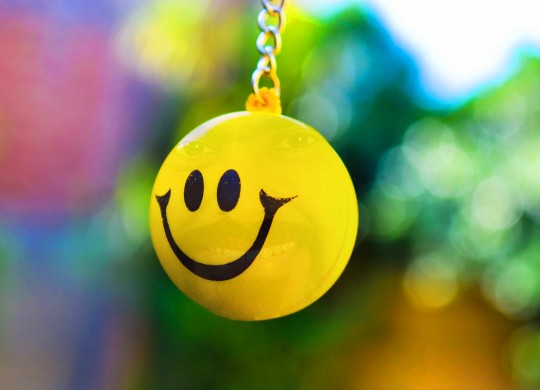Happiness!

Grumble, grumble, grumble.
You know what I’m talking about. That class is horrible, that prof rotten, and those classmates … That job is lousy, that boss is impossible, those co-workers …. Aw, I don’t want to see that bad movie.
And we grumble.
But we are forced to sit through the class, take on that job, watch that movie, and we do, preparing ourselves to hate every second of it … and it turns out to be pretty fun.
Surprise!
And that seems to be the key to enjoyment. The greater the element of surprise, the more the satisfaction.
And, apparently, there is a mathematical model for this, published in a recent issue of the Proceedings of the National Academy of Sciences, titled “A Computational and Neural Model of Momentary Subjective Wellbeing.”
Said lead author and neuroscientist Robb Rutledge, from Max Planck University College London Centre for Computational Psychiatry and Aging Research:
Happiness is not about how well you’re doing in general, but rather if you’re doing better than expected.”
So this is saying that if you go to your favorite restaurant and, as expected, you have a fantastic meal, well, you might have been happier had you expected it to be only average. Apparently, it’s all relative.
Now if you thought all this is about having low expectations in order to maximize happiness, you’d be wrong. Because the low expectations you are having, if low enough, will not necessarily be all canceled out by the surprising happiness you discover at the end. You go to a concert with a friend, expecting it to be pretty mediocre—that pessimism, as you wait for the outcome, is detrimental to your wellbeing. Even if the concert turns out to be unexpectedly great, you’ve already taken a big hit on your happiness quotient in the meantime.
It works the other way, too. If you’ve been bubbling with anticipation about that concert, you’re happy, even if, the concert in the end turns out to be “Meh!”
Rutledge:
The whole day, you might be a little bit happier as a result, even if the performance eventually disappoints and causes unhappiness later on. Before you find out the outcome, you’ll be happier if your expectation is higher.”
So two things to aid our happiness: surprise and positive expectation.
MRI scans were performed on 26 subjects playing a gambling game. Though they all earned a net profit, their self-reported happiness had no relationship with monetary gain. What did correlate with happiness was an unexpected reward (surprise) or their understanding that they had a good chance of making some money (positive expectation).
Ultimate bliss in heaven, too, is contingent upon both positive expectation and surprise.
“In My Father’s house are many dwelling places;
if it were not so, I would have told you; for I go to prepare a place for you.
If I go and prepare a place for you, I will come again and receive you to Myself,
that where I am, there you may be also.”
John 14:2–3
“And He will wipe away every tear from their eyes;
and there will no longer be any death;
there will no longer be any mourning, or crying, or pain;
the first things have passed away.”
Revelation 21:4
Positive expectation!
But guess what? We’re going to be surprised, big time!
But just as it is written,
“Things which eye has not seen and ear has not heard,
and which have not entered the heart of man,
all that God has prepared for those who love him.”
1 Corinthians 2:9
Surprise!
Be happy!












 Abe Kuruvilla is the Carl E. Bates Professor of Christian Preaching at The Southern Baptist Theological Seminary (Louisville, KY), and a dermatologist in private practice. His passion is to explore, explain, and exemplify preaching.
Abe Kuruvilla is the Carl E. Bates Professor of Christian Preaching at The Southern Baptist Theological Seminary (Louisville, KY), and a dermatologist in private practice. His passion is to explore, explain, and exemplify preaching.
2 Comments
Who could say ‘meh’ to that! I look at the trees in the backyard, and see the limbs break, the leaves fall, the wilting leaves, but I think…a little rain will help. And then I think–but can you imagine the Tree of Life, the eternal water pouring forth, the everlasting light, and while I groan in anticipation, the anticipation lightens my soul. Great thoughts on the power of hope.
And then when we’ve been there ten thousand years ….
Thanks, Caroline.